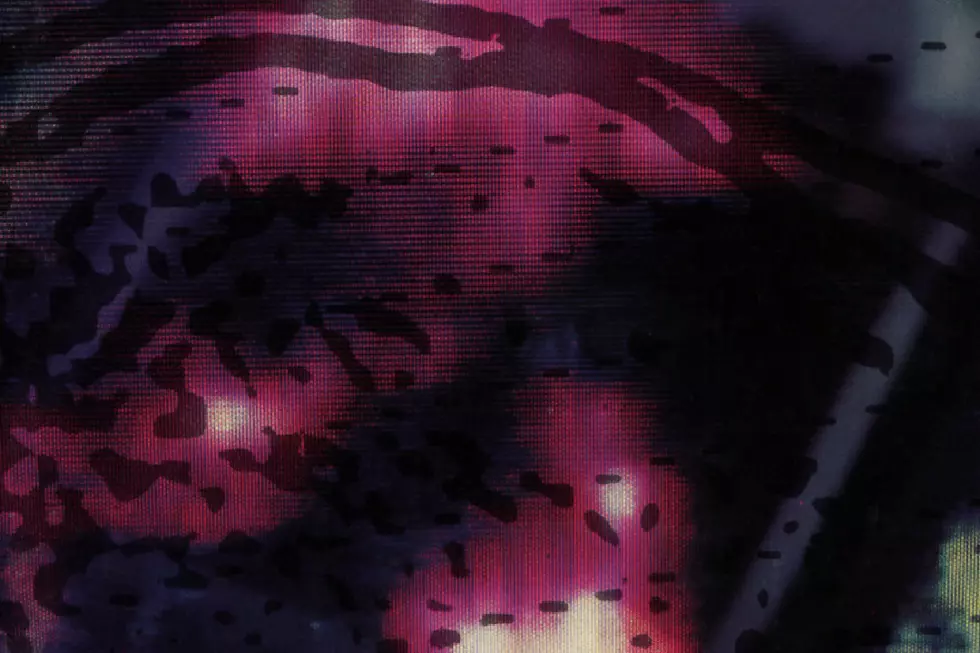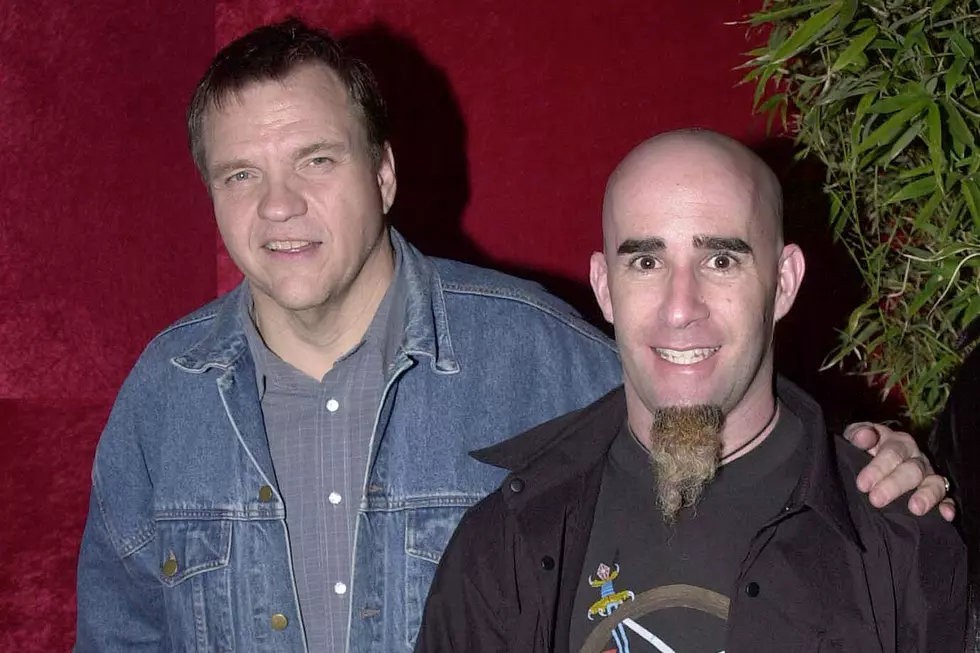
How Anthrax’s ‘Sound of White Noise’ Kicked Off the John Bush Era
Joey Belladonna was fired from Anthrax in 1992, and when he left, he took the shorts, the comic-book references and the teenage sloganeering with him. After having made their name as the lightest-hearted of the leading thrash metal bands of the ‘80s, everything was to change with the arrival of new singer John Bush. And while not all of it was change for the better, they certainly set out with force on Sound of White Noise, which released on May 25, 1993.
“We were going through, let’s say, a metamorphosis,” drummer Charlie Benante said years later. “We were actually saying goodbye to the past and embracing a new sound that had been fighting to get out, from at least myself, for the longest time. When John came into the band it gave me the power to write a new kind of song, like ‘Black Lodge.’”
That was one of four singles to be released from White Noise, after “Only” and “Room for One More,” and before “Hy Pro Glo.” None of them sounded much like the Anthrax of old, but all of them shared qualities of darkness, maturity and reflection – not necessarily qualities that all fans appreciated. Nevertheless, they’d made their point, particularly with “Only,” which Metallica frontman James Hetfield described as a “perfect song” in conversation with guitarist Scott Ian.
“We’re basically happier,” Ian said while promoting the album. “There was a lot of frustration in this group, leading up to the change in singers. It was something we knew we wanted to do, probably since 1988. From ’91 onward it really became stressful.”
He later admitted he’d run out of patience with writing lyrics and having to deal with Belladonna singing them instead of himself, and that he’d unfairly presented an “it’s him or me” ultimatum, and that he should have given Belladonna “a shot.”
Watch Anthrax's Video for 'Only'
The ever-modest Bush refused to overplay the suggestion that he’d breathed new life into the band, saying in 2015, “Anthrax had a lot of success, and I respect Joey Belladonna – he did great for Anthrax. … I just went out and did it from my heart. … I think we made some great records, I just think they were different records than what Anthrax did in the ‘80s. The funny thing is, sometimes there was this, 'Oh, we're the same band, oh, we're the same band,' and looking back, well, we kind of were a little different band. I think we were. But at that time, we kept trying to convince people, 'Oh, it's the same band, it's the same band.' But when you make a singer change, the sound will change a little bit, which, that was what the intention was at the time."
In 2017, he called White Noise an “awesome record,” adding, “I think that all the records were pretty cool in their own way. Some might have been a little bit more focused, and certainly Sound of White Noise was. It didn’t take a long time to mix that record, I remember that.”
However, it wasn’t happy-ever-after. Despite having survived those big changes, a little battered and bruised, the ‘90s were not kind to Anthrax. Lead guitarist Dan Spitz left after White Noise to become a watchmaker, leaving the band as a quartet for a time. Their next album, Stomp 442, released in 1995, was a healthy if not adventurous follow-up. It was succeeded by Volume 8: The Threat is Real in 1998, and featured plenty of their new aggression but less of their inspired writing.
“I thought Stomp 442 was a really cool record,” Bush said in 2017, “but it came on the heels of a major change at Elektra Records, where the head of the label Bob Krasnow – who basically created that label – was fired, and they brought in a new president who told us right after we had recorded Stomp that she would have never made the deal with Anthrax.
"And so we were thinking as we were in that meeting, ‘That doesn’t sound like it’s going to be a good thing!’ and it wasn’t!" Bush added. "So, that sucked, and then we left and we made Volume 8, which I thought was a cool, interesting record, but we were also on an upstart label and took a chance, and that didn’t fare too well.” He’s frequently referred to Volume 8 track “Catharsis” as his favorite Anthrax song, calling it “real emotional.”
Listen to Anthrax's 'Catharsis'
We’ve Come For You All was released in May 2003 (months later than planned due to contract issues), and while it was the first album to feature new guitarist Rob Caggiano, it was to be the last with Bush, who described it as “a little more focused” than anything since White Noise. “It's still an Anthrax album with many different parts that can appeal to a wide audience,” he said. “Our sound is recognizable each time you listen to one of our songs and that's something we really want for our music. You have the fastest rhythms, the more danceable ones, you have everything you can expect from an Anthrax record.” It was generally warmly received and its sole single, “Taking the Music Back,” featured a guest appearance from Roger Daltrey of the Who.
There was a bonus track, a cover of the Ramones’ “We’re a Happy Family” – but that wasn’t to prove the case. Anthrax announced a reunion with Belladonna and Spitz in 2005, and played their classic album Among the Living in its entirety on tour; but despite expectations of a new studio project to follow, negotiations with Belladonna fell through, and Bush declined an invitation to return. Those issues lingered for five more years until Belladonna confirmed his permanent return in 2010. Bush, who’d fronted the band for live shows since 2009, had decided he didn’t want to appear on long-gestating album Worship Music because he hadn’t been part of the writing team, and it didn’t feel “right” to him.
Watch Anthrax Play 'Taking the Music Back'
Wishing Belladonna well with his reunion, Bush said in 2010, “I think that the records in the '90s were records that, for one reason or another, didn't get the same exposure as the records in the '80s. Whatever. The '80s are when it all happened and I completely understand. During the '90s, things were changing and everything was in flux. I think though, that as time goes by, people are going to look at those records and go, ‘Those are really cool records.’”
He recalled White Noise as “a whole different time and circumstance,” adding, “A lot of things were changing in metal and the band was obviously looking to expand on their sound and their style. It all made sense at that time and the end result was a really cool heavy metal record.”
He later reflected: “I think that Anthrax was always a band that was willing to take chances. … They always did things that were possibly considered obscure and / or challenging or risk raking, and sometimes they would fly, sometimes they wouldn’t. But I think that’s admirable. … This genre is supposed to be as edgy as it can be, but yet I think some bands play it safe. Anthrax never did that, and I think that’s something that should be commended. Sometimes things work, sometimes they don’t; that’s the beauty of being an artist. When you have a long career, you’re not always going to hit the bull's-eye, but taking chances, I think is the best thing.”
See Anthrax Among the Top 50 Heavy Metal Albums
More From Ultimate Classic Rock









